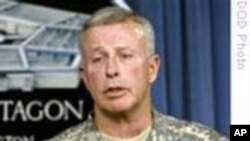The U.S. Congress confirmed General David McKiernan as commander of US Forces-Afghanistan. General McKiernan will also continue to serve as the commander of NATO International Security Assistance Force (ISAF), which includes forces from 40 nations. This realignment of the command structure is intended to enable the most efficient command and control of U.S. forces in Afghanistan and to ensure effective integration and coordination between U.S. and coalition forces operating under NATO/ISAF.
As President George Bush said of Afghanistan, "This is a situation where there has been progress, and there are difficulties."The progress Mr. Bush spoke of is significant: more than 80 per cent of Afghans have access to basic health care services, compared to 9 percent in 2003. As a result, child deaths have decreased by 26 percent. Nearly six million children are enrolled in schools, and more than two million of them are girls. Under the ousted Taliban regime, girls were not allowed to be educated after the age of eight.
Just as significant for the well-being of the people are improvements to the country's infrastructure. Since 2002, the U.S. Agency for International Development, or USAID, has reconstructed or built thousands of kilometers of roads; canals, pipelines and irrigation structures; rehabilitated or built power plants, hydroelectric dams and power-lines.
But as Mr. Bush said, Afghanistan still faces a number of problems, many of them associated with the Taliban insurgency. Afghanistan is the world's leading grower of opium poppies, the source of heroin. The growers and traffickers are protected by the Taliban and other insurgents -- for a cut of the profits. The Taliban will rake in an estimated one hundred million dollars in profit this year alone -- money that will be used to continue the war in Afghanistan.
Indeed, violence is on the upswing in the country. Some of it can be attributed to drug gangs. But there has also been a significant increase in raids by foreign fighters who are based in Pakistan and cross into Afghanistan to carry out attacks.
These problems cannot be resolved piecemeal. They must be dealt with in a coordinated manner, by the Government of Afghanistan, the international community, and neighboring states, utilizing the full range of military, political, economic, and social programs. Cooperative efforts such as Border Coordination Centers and formal talks must be expanded.The governments of Afghanistan and Pakistan, and representatives of tribes and provincial governments on both sides of the border, must work together to rid themselves of those who would kill and destroy for their own ends.













